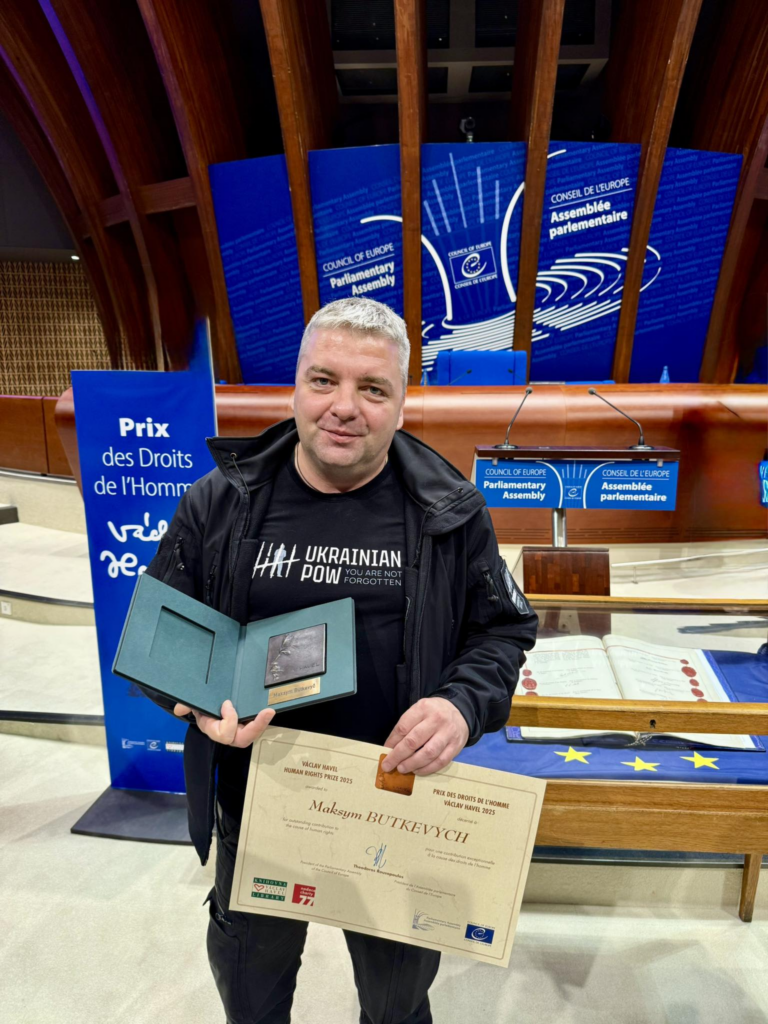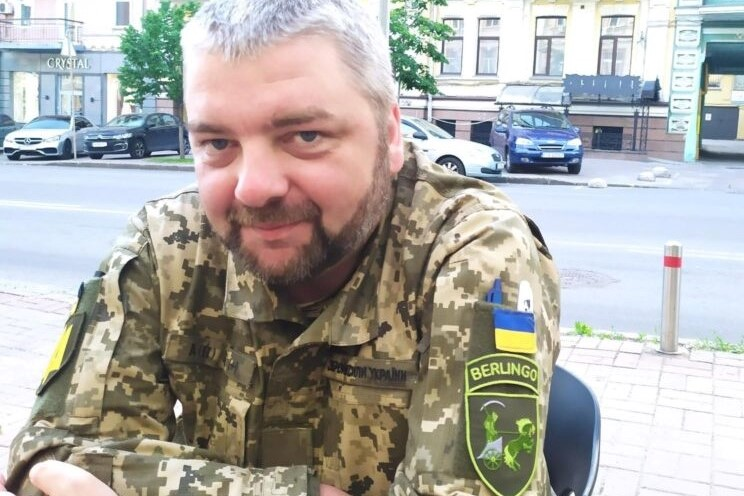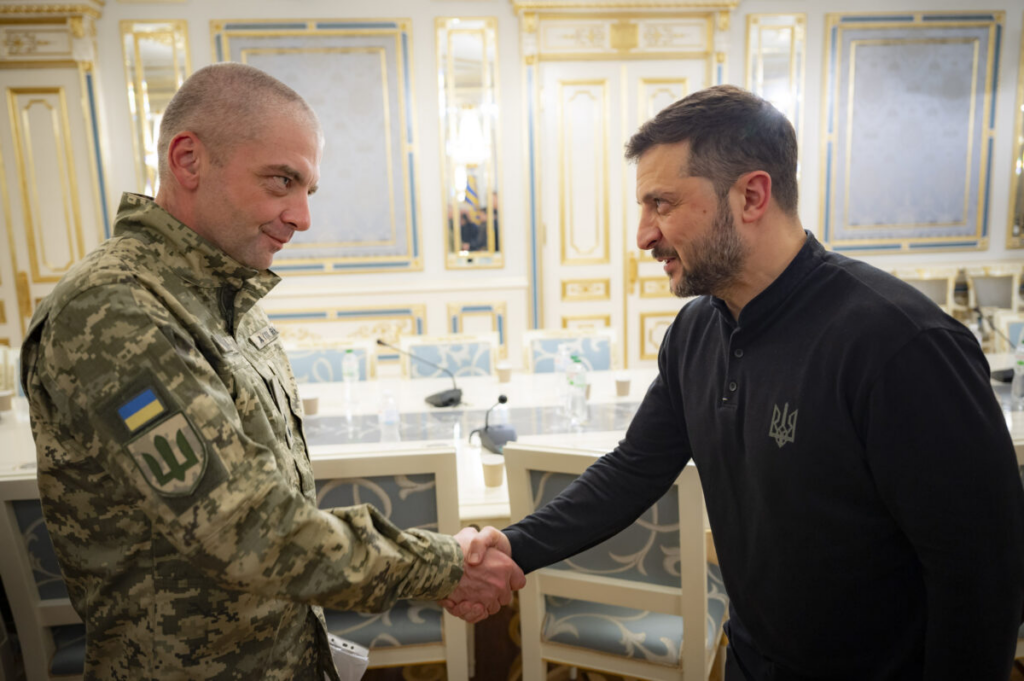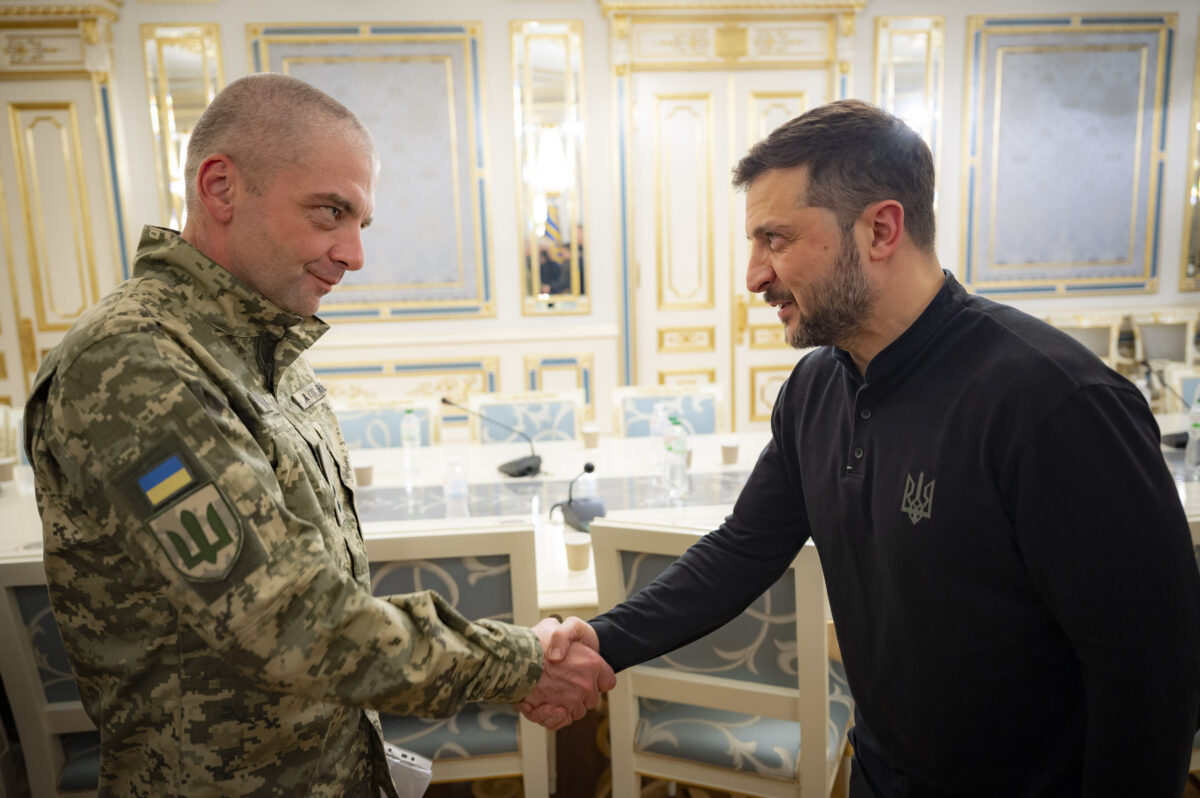For the first time since its establishment in 2013, the Václav Havel Human Rights Prize has been awarded to a Ukrainian citizen.
The Parliamentary Assembly of the Council of Europe presented its thirteenth annual prize to journalist and human rights defender Maksym Butkevych at a ceremony in Strasbourg on 29 September.
Wearing a black hoodie with the message “Ukrainian POW. You Are Not Forgotten,” Butkevych accepted the honor a year after walking out of Russian captivity where he spent two and a half years and was freed in a prisoner exchange on 18 October 2024.
The award, given in partnership with the Václav Havel Library and the Charta 77 Foundation, recognizes outstanding civil society action defending human rights in Europe and beyond. Recipients receive 60,000 euros, a trophy, and a diploma.
At the ceremony on the opening day of PACE’s autumn plenary session, Butkevych dedicated his award to Ukrainian prisoners of war and civilians still held by Russia, and to journalists imprisoned under authoritarian regimes worldwide.
“Ukraine defends not only its territorial integrity, but also fundamental values,” he said. “Our co-operation, our freedom and our desire to live in mutual respect, with dignity and without fear, are based on these values.”
He urged the world not to forget them, and all those who fight for freedom and dignity.

Two runner-up journalists remain imprisoned for their work
The Strasbourg ceremony highlighted a broader crisis of press freedom across Europe and in neighboring authoritarian states.
All three candidates shortlisted for the 2025 prize were journalists. The two runners-up—Georgian journalist Mzia Amaghlobeli and Azerbaijani journalist Ulvi Hasanli—remain detained in their home countries. Their representatives collected diplomas on their behalf.
PACE President Theodoros Rousopoulos, himself a former journalist, noted the pattern wasn’t coincidental. The Council of Europe’s Safety of Journalists Platform recorded 171 journalists detained across Europe by mid-March. Ninety-eight are in Council of Europe member states. At least 26 Ukrainian journalists remain unlawfully held by Russia.
Rousopoulos called for the immediate release of Amaghlobeli and Hasanli, telling them: “Your voice may be silenced, but your testimony is heard loud and clear.”
He thanked all three candidates for their courage in opposing authoritarianism and for acting as role models for a generation of journalists and human rights defenders.
“Governments should not be afraid of the truth,” he said.
“Former pacifist who took up arms without hesitation”
Ukrainian politician Yevheniia Kravchuk wrote on Facebook that Butkevych embodies modern Ukraine’s struggle—”a human rights defender who spent years rescuing refugees, a journalist who built free media, a former pacifist who took up arms without hesitation.”
She quoted his own words: “Where there is no possibility to create meaning, we gradually cease to be human.”

Who is Maksym Butkevych?
Maksym Butkevych co-founded the Zmina Human Rights Center in 2012, during the rule of Russian-backed president Viktor Yanukovych. A year later, he helped establish Hromadske Radio during the 2013 Revolution of Dignity that drove Yanukovych from power.
Before that: BBC World Service, Ukrainian television channels, guest lectures at Kyiv-Mohyla Academy. He sat on the board of Amnesty International’s Ukrainian branch and the public council under the Ministry of Internal Affairs.
As a leading member of the Committee for Solidarity with Kremlin Hostages, he helped secure the release of several Ukrainian political prisoners held in Russia, including filmmaker Oleg Sentsov, before becoming a prisoner himself.
He ran the “Without Borders” project helping asylum seekers and displaced persons, and combating hate speech. For nearly 20 years, Butkevych built a reputation as a steadfast pacifist. Then came February 2022.
Pacifist takes arms to defend his country when full-scale aggression begins
Butkevych volunteered for the Armed Forces of Ukraine on the first day of the full-scale invasion, despite having no combat experience beyond decades-old university officer training.
“I understood that if the Russians prevailed, there would be no more human rights protection in this territory,” he told ZMINA Human Rights Center in his first major interview after release.
“We’ve fought long and hard for the rights we have today. But if they’d come to these territories, everything would have been destroyed.”
He became a platoon commander in the 210th Separate Special Battalion “Berlingo,” fighting in the Battle of Kyiv before his unit was deployed east to halt the Russian push into Donbas.
Four months into the war, Russian forces captured him and eight of his men near Hirske in Luhansk Oblast. A captured Ukrainian soldier, forced to cooperate under threat of violence, led them into a trap in an open field with no cover.
Russia stages a show trial
After capture, the Kremlin’s propaganda machine went to work, churning out reports calling him a “propagandist,” “Nazi,” and “commander of a punitive squad.”
Butkevych spent a year and three months in a pre-trial detention center in occupied Luhansk, enduring interrogations and psychological torture that began the moment of capture.
In March 2023, a court in occupied Luhansk sentenced him to 13 years in a strict regime colony. The charges: launching grenades at a residential building in Sievierodonetsk and wounding two women. The evidence was entirely fabricated.
Russian interrogators had forced Butkevych to sign a false confession the previous August under threat of execution, then brought him to a supposed crime scene to pose for photographs and memorize details of crimes he never committed.
Ukraine’s Foreign Ministry called it what it was—a staged trial to legitimize political reprisals. Butkevych later learned from a Russian investigator that the lengthy sentences served a cynical purpose: matching the penalties Ukraine imposed on Russian soldiers for illegal border crossing, ensuring they remained exchangeable.

Reads Bible and teaches English with cigarette packets in prison
In captivity, Butkevych kept his mind sharp and his purpose intact. He read the New Testament and Psalter aloud to fellow inmates (many too injured or ill to read themselves) going through the text at least 15 times. Once books became available after a year and a half, he devoured approximately 50 of them.
Perhaps most remarkably, he taught English to fellow prisoners using nothing but cigarette filters, burnt matches, and scraps of cigarette packets to explain sentence structure. They learned through song lyrics he could remember.
“I have a sense of purpose that’s inseparable from the meaning of life,” he told ZMINA. “I never doubted that people remembered me, that they were trying to secure my release, that they were thinking of me and praying for me.”
Butkevych urges to remember other POWs and political prisoners detained in Russia
After spending two and a half years in Russian captivity, Butkevych was released on 18 October 2024 in a prisoner exchange—the 58th swap that brought 95 Ukrainians home, including 48 sentenced to lengthy prison terms on fabricated charges.
Butkevych told the Strasbourg assembly the award would have been “only a dream” during his captivity. Now he carries it as recognition of one person’s courage and the resilience of the Ukrainian nation fighting for its right to exist.
Many of his fellow prisoners remain in Russian custody. In his first interview after release, Butkevych reflected on his captivity with characteristic purpose:
“I tried to understand what I could learn from this experience that might help me better serve others in the future.”
The human rights defender who once advocated for Ukrainian political prisoners in Russia, then became one himself, now carries Europe’s highest honor and the knowledge of what thousands still endure in Russian detention.
The human rights defender who once advocated for Ukrainian political prisoners in Russia, then became one himself, now carries Europe’s highest honor and a determination to expose what thousands still endure behind Russian bars. His message from Strasbourg: the world must not forget them.
Read also
-
Russia gave him 13 years for crimes he never committed. Now journalist-turned-soldier won Europe’s highest human rights honor – the first Ukrainian ever
-
95 Ukrainian defenders return from Russian captivity, including Azov fighters and POWs facing life sentences
-
Russia sentences prominent Ukrainian human rights activist for defending his homeland




